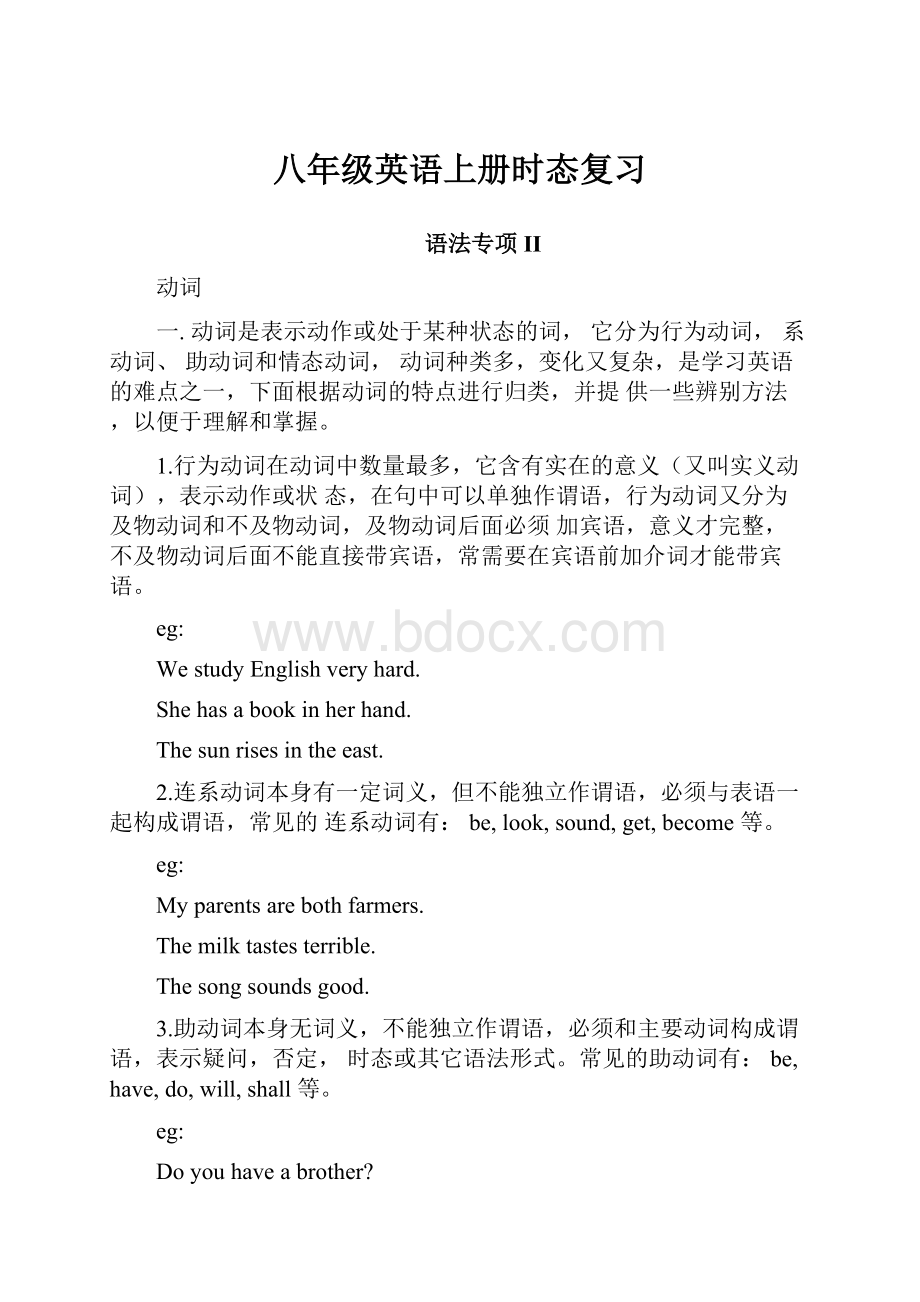八年级英语上册时态复习.docx
《八年级英语上册时态复习.docx》由会员分享,可在线阅读,更多相关《八年级英语上册时态复习.docx(15页珍藏版)》请在冰豆网上搜索。

八年级英语上册时态复习
语法专项II
动词
一.动词是表示动作或处于某种状态的词,它分为行为动词,系动词、助动词和情态动词,动词种类多,变化又复杂,是学习英语的难点之一,下面根据动词的特点进行归类,并提供一些辨别方法,以便于理解和掌握。
1.行为动词在动词中数量最多,它含有实在的意义(又叫实义动词),表示动作或状态,在句中可以单独作谓语,行为动词又分为及物动词和不及物动词,及物动词后面必须加宾语,意义才完整,不及物动词后面不能直接带宾语,常需要在宾语前加介词才能带宾语。
eg:
WestudyEnglishveryhard.
Shehasabookinherhand.
Thesunrisesintheeast.
2.连系动词本身有一定词义,但不能独立作谓语,必须与表语一起构成谓语,常见的连系动词有:
be,look,sound,get,become等。
eg:
Myparentsarebothfarmers.
Themilktastesterrible.
Thesongsoundsgood.
3.助动词本身无词义,不能独立作谓语,必须和主要动词构成谓语,表示疑问,否定,时态或其它语法形式。
常见的助动词有:
be,have,do,will,shall等。
eg:
Doyouhaveabrother?
HaveyougotanEnglish-Chinesedictionary?
Ididn'tgotothecinemayesterday.
4.情态动词本身有词义,但不能独立作谓语,只能和主要动词一起构成谓语,表示说话者的语气和情态,情态动词没有人称和数的变化,情态动词本身可以构成疑问和否定,常见的情态动词有:
can,may,must,will,shall,need等。
eg:
CanyousingtheEnglishsong?
Everyonemustgettoschoolontime.
2.动词的时态:
(一)时态概述:
作谓语的动词用来表示动作(情况)发生时间的各种形式称为时态,英语中的时态,就是通过特殊的动词词尾或加一些相关的助动词be,have(has)等,用来
表示动作或事件发生的不同时间和方面。
eg:
Hereadsnewspaperseveryday.
Hereadthenewspaperyesterday.
Heisgoingtoreadthenewspapertomorrow.
(二)一般现在时:
1.动词变化:
一般现在时主要用动词原形表示,但第三人称单数后要加词尾-s,另外
be和have有特殊的人称形式。
在加词尾-s时要注意:
情况
加法
例词
一般情况
加-s
reads,writes,says
以ch,sh,s,x,或o收尾的词
加-es
teaches,washes,guesses,fixes,goes
以“辅首字母+y”结尾的词
变y为i再加-es
try—triescarry—carries
、十
读曰:
情况
读法
例词
在[p][t][k][f]等清辅音后
[s:
helps,hates,asks,laughs
在[s][z][][t][d3]等音
后
[iz:
faces,rises,wishes,
watches,urges
在其他情况下
[z:
plans,cries,shows
2.一般现在时主要表示:
(1)经常性或习惯性的动作,常与这样的时间状语连用:
always,often,usually,
sometimes等
eg:
Wealwayshelpeachother.
Itoftensnowsinwinter.
Igetupearlyeverymorning.
(2)表示主语现在的特征、性格、能力等。
eg:
Helovessports.
Janeisanoutgoinggirl.
TomandTimbothhavemediumheight.
(3)表示客观、普遍真理
eg:
Twoandfourmakessix.
Waterboilsat100C
Themoonmovesroundtheearth.
3.一般现在时的疑问句一般以在句首加助动词do,does的方式构成。
第三人称单数加
does,其他加do,这时动词一概用原形;动词be只需与主语位置对调就行了。
eg:
DoyoulikeEnglish?
Dotheyhavestorybooks?
Whatdoesshedoeveryevening?
Issheathome?
AreyougoodatEnglish?
4.一般现在时的否定式是donot(don't)或doesnot(doesn't)+动词原形来构成的,be动词做谓语动词只需在be后加not构成否定。
eg:
Idon'tlikeorangesatall.
Shedoesn'tworkintheTVstation.
Theyaren'tstudents.
I'mnotbusyeveryweekend.
3.现在进行时:
1.
do-doing
suffer-sufferingspend-spending
动词变化:
现在进行时由“am/is/are+动词现在分词”构成。
加-ing的规则如下:
(1)一般在动词原形末尾加-ing。
如:
stay-staying
listen-listening
work-working
e结尾的动词,先去掉e,再加-ing。
如:
take-taking
ride-riding
refuse-refusingoperate-operating
look-looking
(2)以不发音的字母
make-making
give-giving
please-pleasing
close-closing
-ing。
如:
(3)以一个辅音字母结尾的重读闭音节词,先双写这个辅音字母,再加put-puttingsit-sitting
win-winning
run-runningbegin-beginning
2.现在进行时的用法
(1)表示说话时正在进行或发生的动作,这时可以不用时间状语,也可以和now,at
present,atthemoment等时间状语连用。
有时用一个动词,女口look(看),listen(听)。
eg:
Whatareyoureadingnow?
Listen!
Someoneissingingintheclassroom.
(2)表示当前一段时期的活动或现阶段正在进行的动作。
eg:
Theyareworkinginafactorythesedays.Moreandmorepeoplearegivingupsmoking.
即可以用来代替将来
(3)表示最近按计划或安排要进行的动作。
现在进行时有时可表示一个在最近按计划或安排要进行的动作,时。
eg:
Whenareyouleaving?
AreyougoingtoTibettomorrow?
3.
be(am,is,are)后面力口not;
现在进行时的否定句和疑问句比较简单。
否定句在疑问句把be动词移到主语前。
eg:
Iamnotworking.
Whatareyoureadingnow?
Howareyoufeelingtoday?
Thetrainisn'tarrivingsoon.
四.一般过去时:
1.动词变化:
一般过去时主要表示过去的动作或状态,在句中由主语+动词的过去式来表达。
构成规则
原形
过去式
一般在动词末尾加-ed
work
worked
plant
planted
play
played
结尾是e的动词在末尾加-d
like
liked
live
lived
change
changed
末尾只有一个辅音字母的重
plan(计划)
planned
读闭音节词,先双写这个辅音
stop
stopped
字母,再加-ed
drop
dropped
以辅音字母加y结尾的,先变
carry
carried
y为i再加-ed
study
studied
cry
cried
否定式
疑问式
否定疑问式
简单回答
Ididnotwork.
DidIwork?
DidInotwork?
Yes,youdid.No,youdidn't.
Youdidnotwork.
Didyouwork?
Didyounotwork?
Yes,Idid.No,Ididn't.
He/She/Itdidnot
Didhe/she/it
Didhe/she/itnot
Yes,he/she/it
work.
work?
work?
/did.
No,he/she/itdidn't.
Wedidnotwork.
Didwework?
Didwenotwork?
Yes,youdid.No,youdidn't.
Youdidnotwork.
Didyouwork?
Didyounotwork?
Yes,wedid.No,wedidn't.
Theydidnotwork.
Didtheywork?
Didyoutheynotwork?
Yes,theydid.No,theydidn't.
2.一般过去时的基本用法:
(1)带有确定的过去时间状语时,要用过去时。
(eg:
yesterday,lastyear,just
now,twodaysago,intheolddays等)
eg:
Heleftjustnow.
LeiFengwasagoodsoldier.
Whatdidyouhaveforbreakfastthismorning?
(2)表示过去某一段时间内经常或反复发生的动作,这时常和表示频度的状语连用。
eg:
Lasttermweoftendidexperiments.
Healwayswenttoworkbybus.
五.begoingto表示一般将来
1.用法:
表示现在打算在最近或将来要做的事,或表示说话人根据已有的迹象认为很有可能要发生的事情,be随着人称的变化变成(am,is,are)
eg:
Wearegoingtohaveanewsubjectthisyear.
It'sgoingtorainthisafternoon.
I'mgoingtobeapilotwhenIgrowup.
2.begoingto的否定句在be动词后加上not;begoingto的疑问句把be动词移到
主语前。
eg:
Heisn'tgoingtoseehisbrothertomorrow.
I'mnotgoingtotellyouaboutit.
Whosgoingtouseit?
Isyoursistergoingtobringyourlunch?
WhatareyougoingtodonextSunday.
【模拟试题】(答题时间:
70分钟)
一.改错:
例1:
Therosedarkred.Theroseisdarkred.
1.Heverylikesswimming.
2.Hecanhelpsyou.
3.Wehaven'tagoodtime.
4.Whatareyoudoafterschooleveryday?
5.SometimesIlistenmusic.sometimesIplayoutside.
6.Thefishsmellsnotgood.
7.Weshouldbuysomechicken.Therearelittleleft.
8.Therehavemanybirdsinthesky.
9.Mymother'sglassesisbroken.
10.Apairofshoesarenearlyonethousand.
11.Whatcolourareherhair?
12.Doeshehishomework?
13.A:
Doyoulikeyourclass?
B:
Yes.Ilike.
14.HealwaysdohisshoppingonFridayevening.
15.IverysorryIforgotyourbirthday.
16.Ihavenobrotherandsister.
2.连词组句:
1.listen,morning,the,to,I,radio,the,in,often
2.of,men,nurses,good,sick,hospital,care,in,take,the
3.weekdays,he,the,goes,cinema,never,during,the,to
puter,got,new,you,a,have?
5.weekends,he,rest,does,a,got,have,on?
6.good,LiMing,do,and,often,Ideeds
7.museum,they,the,often,science,visit,how,do?
8.the,in,any,there,kitchen,food,is?
9.homework,does,day,when,Tom,his,every,where,and,do?
10.a,there,vegetables,many,but,apples,aren't,lot,there,of,are,there
3.用括号里的动词的适当形式填空:
1.There(be)someglassesonit.
2.He(go)totheparkeveryday.
3.Myuncle(live)inNanjingnow.
4.LucyandLily(like)China?
5.LiLei(notlike)todrinkorangesoda.
6.Thegirl(go)homeat4:
30intheafternoon.
7.Kate(speak)French?
Yes,shedoes.
8.Jim(notride)hisbikeoften.
9.Ifhe(be)freetomorrow,he(go)withus.
10.Assoonasthey(get)therenextmonth,he(call)me.
11.LiMing'sfather(have)hislunchathome?
12.Tom(notdo)themorningexercisesoften.
13.I(be)hungryandmysister(be)thirsty.
14.Thebaby(have)curlyhair.
15.Everybody(have)achancetowin.
16.I(clean)myroomonceaweek.
17.Nobody(tell)themanything.
18.There(be)alotofchickenontheplate.
19.Mr.Li(teach)thesecondgrade.
20.Theboy(watch)TVeveryevening.
21.Mary(play)theviolinquitewell.
22.David(study)ChineseandI(study)English.
23.Thegame(be)interesting.
24.Manychildren(be)ontheplayground.
25.He(have)agoodtimeatyourparty.
26.I(have)anewbicycle.
4.用所给词的适当形式填空:
1.Tomandhisfather(swim)now.
2.Look!
They(run)alongthestreet.
3.We(practice)hardthesedaysbecausewewillhaveabigmatchnext
month.
4.Whathe(do)atnineo'clocklastnight?
5.They(listen)tothemusicatthattime.
6.Whentheheadmastercamein,thestudents(read)thetext.
7.We(watch)TVwhensuddenlythetelephonerang.
8.She(make)thepaperflowersthewholenight.
9.A:
you(studying)English?
B:
Yes,Iam.
10.Let'sgoout.It(notrain)now.
11.Hurryup!
Everybody(wait)foryou.
12.A:
(you/listen)totheradio?
B:
No,Youcanturnitoff.
13.I(watch)TVatseveno'clockyesterdayevening.
14.A:
What(you/look)for?
B:
I(look)formywallet.Thereissomethingimportantinit.
15.Look.It(rain)hard.We'llgetwetifwegoout.
5.选词填空:
(一)选词填空:
1.I(am,is,was,were)busylastweek.
2.TomandI(am,are,was,were)lateforschoolyesterday.
3.I(walk,walks,walked,walking)toschooltheotherday.
4.Rose(doesnot,didn't,hasbeen,hasto)visitherunclethemonth
beforelast(month)
5.There(is,was,are,were)alotofpeopleinthisvillagetenyears
ago.
6.Mother(am,is,was,were)illinbedlastnight.
7.It(rain,rains,rained,raining)alotlastyear.
(二)用括号中动词的适当形式填空:
1.MyuncleinLondon(send)abirthdaypresenttomeyesterday.
2.When(be)youborn?
3.Assoonashearrivedinthecountry,he(phone)me.
4.WhenI(knock)athisdoor,hewascooking.
5.WewerewatchingTVwhenthelight(go)out.
6.Hesaidhe(notlike)mathsatall.
(三)用括当的词完成下列句子。
1.youmakethiscakelastnight?
Yes.Idid.Iitforyou.
2.DidTomhomeatfiveyesterday?
No,he.Hecamehomeatsix.
3.Whatyouatthestore?
Iboughtacamera.
4.Wereyouathomeyesterday?
Yes,I.
5.Wheredidyoucatchthefish?
Iitintherivernearmyhouse.
6.完成下列句子:
1.你长大了想当什么?
我打算当个电脑程序员。
Whatyouwhenyou?
I'mtoa.
2.你哥哥长大了打算当什么?
他打算当个专业的篮球运动员。
Whatyourbrotherwhenhe?
He'stoaplayer.
3.你打算怎么做?
我打算学计算机学。
areyouthat?
I'mcomputer.
4.你哥哥打算怎么做?
他打算每天练篮球。
isyourbrother?
He'sbasketballeveryday.
5.她打算下学期上一些表演课吗?
是的。
shesomelessons?
Yes,she.【试题答案】
1